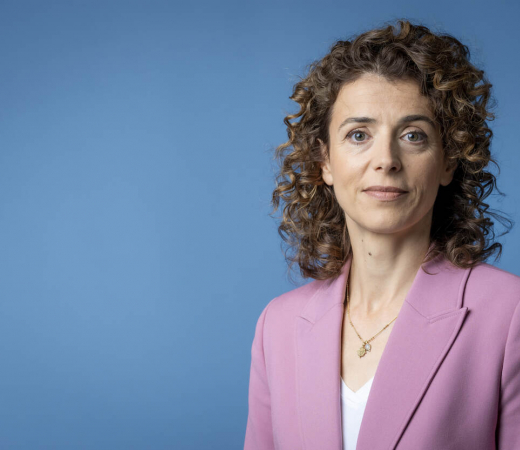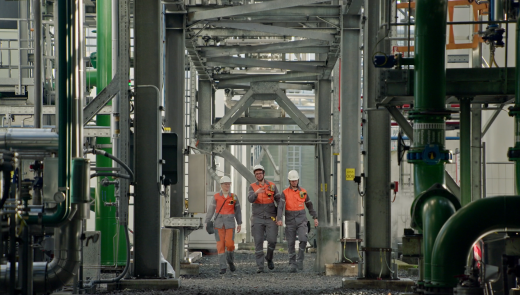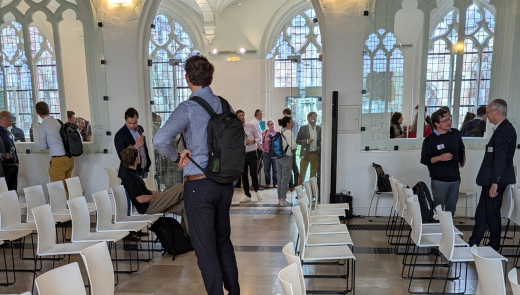Smart Delta Resources NL responds to additional climate package from Minister Hermans of 'Klimaat & Groene Groei'

Last Friday, the cabinet presented the long-awaited supplementary climate package as part of the Spring Decision-Making Process. These plans by Minister Hermans were also intended as a response to the dire situation facing Dutch basic industry and the energy sector — including in our region. Last month, Smart Delta Resources, together with other regional partners, made an urgent call for structural breakthroughs in the Spring Memorandum. The members of Smart Delta Resources recognise in the package concrete steps with which the cabinet wants to actively contribute to and steer towards a clean, competitive industry.
Tabita Verburg (Chair of Smart Delta Resources NL):
Deputy Jo-Annes De Bat (Province of Zeeland) also sees the package as a step in the right direction:
"The package is a good first step towards actually regaining trust. By taking on the risk associated with CO2 storage, the government will encourage companies to get on board more quickly and thus achieve reductions in the short term. The fact that the plastic tax will not be introduced is good news and ensures that competitiveness will not deteriorate. However, more will need to be done in the run-up to the summer, particularly in terms of building mutual trust.”
Based on an initial analysis, Smart Delta Resources reflects below on the main points of the package. These also form input for further dialogue ahead of parliamentary debate on the package.
Positive steps on net tariffs, but no structural breakthroughs yet
The government is taking some meaningful steps, including measures to mitigate the effects of high energy prices in the short term. For example, indirect cost compensation (IKC) will be reintroduced for three years and TenneT will receive state guarantees to enable it to invest more quickly and cost-effectively in the necessary expansion of the electricity grid. This is an important boost.
At the same time, there is still no structural solution to the high grid tariffs that are hampering Dutch industry. However, the government will further investigate whether the amortisation variant, whereby part of the grid costs are spread over a longer period, is possible. At Smart Delta Resources, we look forward to the results of this investigation and the decision-making on this matter at Prinsjesdag in September.
More realistic approach to hydrogen, but pace remains essential
With this package, the government is also making choices that offer prospects for the upscaling of hydrogen. The mandatory use of RFNBOs (renewable fuels of non-biological origin) in industry will be adjusted to 4% — a more realistic level, given the current state of hydrogen production in the Netherlands. This is conditional on the costs being bearable and access to affordable hydrogen infrastructure. The so-called “refinery route” will also be facilitated, with the correction factor being adjusted to 1.0 in order to provide the certainty required by the market for electrolysis projects in the Netherlands. The increase in the sub-obligation for RFNBOs in road transport will provide scope for more electrolysis capacity.
The industry cluster is also pleased that resources are being deployed to stimulate hydrogen projects, both on the demand and production sides.
Measures to make industry more sustainable
It is positive that the SDE++ scheme will also be open for 2026, including for technologies such as CO₂ capture and storage. This will help companies that want to realise their sustainability projects. At the same time, approximately €600 million will be cut from the Climate Fund to make room for a reduction in energy taxes for households. Although this is understandable and sympathetic in these times of high inflation, it should not be at the expense of the resources intended to accelerate the industrial transition.
National levies affecting the level playing field
The additional CO₂ levy will remain in place as a means of exerting pressure on companies that are not becoming sufficiently sustainable. At the same time, many companies are struggling because essential preconditions are lacking, such as connection to energy infrastructure, timely granting of permits, stable policy and sufficient space. As long as these preconditions are not met, the levy will inhibit investment rather than stimulate the transition. For this reason, the government is adjusting the scheme: companies will be given more time to become sustainable and the tariff path will remain unchanged until at least 2030. The effects of these and other adjustments to the levy will be further investigated in the coming period.
In addition, the announced levy on new plastics will not be implemented and an alternative approach to the circular plastics standard (CPN) will be explored. Although we in our cluster are also working together towards a circular economy with greater use of sustainable carbon sources, a national levy such as this would disproportionately affect the competitive position of the Dutch chemical industry and increase the risk of leakage effects. Through the new Plastic Table, our cluster will also engage in discussions about alternative measures that can strengthen the business case for renewable plastics compared to fossil-based variants.
Energy and CO2 infrastructure
It is positive that the national government is taking more control of 25 of the most urgent infrastructure projects, including several in Zeeland. The ambition to speed up procedures, relax the permit requirement for small expansions of high-voltage substations and limit the repetition of research contributes to this. The additional resources for regions where national infrastructure converges – such as in industrial clusters – are also an important support. In addition to electricity and hydrogen infrastructure, the government also recognises the essential role of CO₂ infrastructure. For example, through EBN, the national government is taking on additional financial risks in the Aramis project, which increases the chances of success and helps to keep future transport tariffs competitive.
Follow-up
Smart Delta Resources will continue to analyse the package together with its partners in the coming period and will enter into discussions with the government about the necessary follow-up steps, including the coherence with (the continuation of) the tailor-made approach. Making industry more sustainable is not only essential for the climate, but also for the future of employment, innovation and economic strength in our region.

